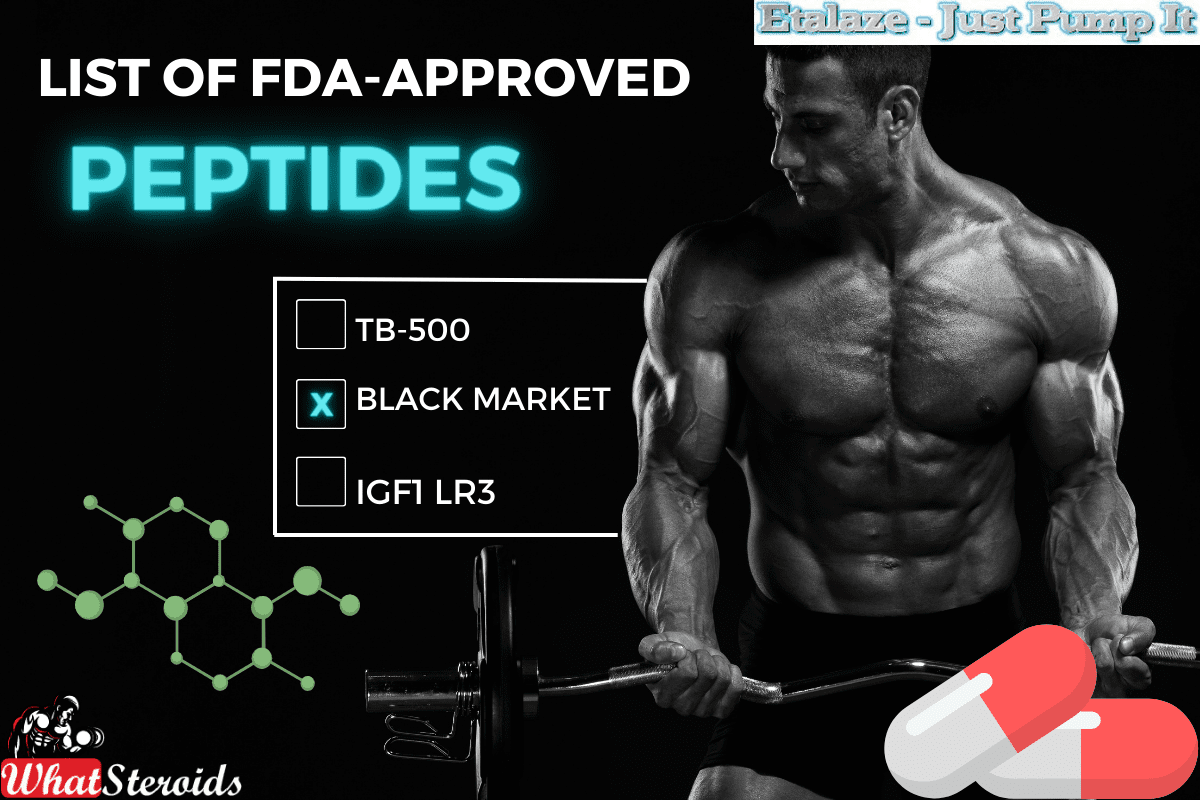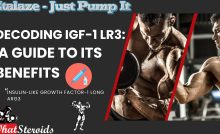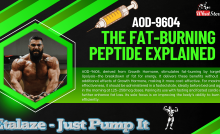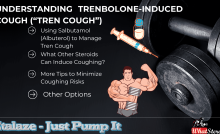List of FDA-Approved Peptides


When it comes to bodybuilding, peptides have gained significant attention for their potential benefits in muscle growth and performance enhancement. However, it is crucial to prioritize safety and legality in the pursuit of achieving desired results.
Related Article: Best Post Cycle Therapy (PCT): 100% Recovery Within 6 Weeks
Why Peptides?
Bodybuilders use peptides for various reasons, including:
Muscle Growth
Some peptides, like growth hormone-releasing peptides (GHRPs) and growth hormone secretagogues (GHSs), are believed to stimulate muscle growth and repair, which can aid in muscle building.
Fat Loss
Certain peptides, such as melanotan II and peptide YY, are thought to promote fat loss by increasing metabolism or reducing appetite.
Recovery
Peptides like BPC-157 and TB-500 are believed to enhance recovery by promoting tissue repair and reducing inflammation, potentially allowing for more frequent and intense workouts.
Endurance
Some peptides, such as erythropoietin (EPO) mimetics, are thought to increase red blood cell production, leading to improved endurance and performance during workouts.
Injury Prevention
Peptides like collagen peptides are believed to support joint and connective tissue health, potentially reducing the risk of injuries associated with intense training.
In this section, we will provide you with a list of FDA-approved peptides that are commonly used by bodybuilders.
Growth Hormone Releasing Peptides (GHRPs)
GHRPs stimulate the release of growth hormone, promoting muscle growth and recovery. FDA-approved GHRPs include: - Tesamorelin (Egrifta) - Sermorelin (Geref)
Growth Hormone Secretagogues (GHSs)
GHSs also stimulate the release of growth hormone and offer potential benefits for bodybuilders. An FDA-approved GHS is: - Macimorelin (Macrilen)
Insulin-like Growth Factor-1 (IGF-1) Peptides
IGF-1 plays a vital role in muscle development and repair. One FDA-approved IGF-1 peptide is: - Mecasermin rinfabate (Increlex)
4. Gonadotropin-Releasing Hormone Analogs
These peptides regulate hormone levels in the body, impacting muscle growth and performance. An FDA-approved analog is: - Leuprolide acetate (Lupron Depot) Thank you for providing information on various growth hormone-related peptides and analogs.
Tesamorelin (Egrifta)
Tesamorelin is a growth hormone-releasing peptide that has been approved by the FDA for the treatment of HIV-associated lipodystrophy. It stimulates the release of growth hormone, which can promote muscle growth and aid in recovery.
Sermorelin (Geref)
Sermorelin is another FDA-approved growth hormone-releasing peptide that stimulates the production and release of growth hormone from the pituitary gland. It may be used to treat children with growth hormone deficiency or adults with low levels of growth hormone.
Macimorelin (Macrilen)
Macimorelin is a Growth Hormone Secretagogue (GHS) that received FDA approval for diagnosing Adult Growth Hormone Deficiency (AGHD). GHSs like macimorelin stimulate the release of growth hormones from the pituitary gland, aiding in muscle development.
4. Mecasermin rinfabate (Increlex)
Mecasermin rinfabate is an insulin-like Growth Factor-1 (IGF-1) peptide approved by the FDA for treating children with short stature due to severe primary IGF-1 deficiency or IGF-1 gene deletion mutations. IGF-1 plays a crucial role in promoting muscle development and repair.
Leuprolide acetate (Lupron Depot)
While not strictly categorized as a peptide, leuprolide acetate belongs to a class called Gonadotropin-Releasing Hormone Analogs, which regulate hormonal levels in both males and females by suppressing sex hormones such as testosterone or estrogen. This regulation can indirectly impact muscle growth and performance. It's important to note that these substances are only available under prescription and should always be used under the guidance of a healthcare professional.
It's important to note that while these peptides are FDA-approved for specific medical conditions, their off-label use for bodybuilding purposes may not be explicitly endorsed by regulatory authorities.
Before incorporating any peptide into your fitness regimen, it is crucial to consult with a healthcare professional who specializes in sports medicine or endocrinology to ensure safe usage and proper dosing.
Remember that achieving optimal results in bodybuilding requires a comprehensive approach involving proper nutrition, training, rest, and guidance from qualified professionals.
HGH Frag 176-191
This peptide is known for its fat-burning. It is specifically designed to target and break down fat cells, helping individuals achieve a leaner physique while preserving muscle mass.
TB-500
It is widely used for its ability to promote healing and recovery from injuries, making it a valuable asset for athletes engaged in intense training regimens.
Must Read: Horse Chestnut and Other Supplements to Get Rid of Water Retention
IGF1 LR3
This peptide stimulates muscle cell growth, leading to increased muscle mass and improved recovery time.
The peptide works as a protein hormone and contains a very unique chemical structure.
Additionally, LR3 it is the same as a natural insulin hormone (IGF-1) found in the liver and pancreas.
This makes it good in stimulating several natural processes such cellular growth and differentiation. For this reason, it ranks among the highest for bodybuilders who want to grow muscle.
Again, IGF1 LR3 promotes the development of Growth Hormone (GH).
Growth hormone (GH) is needed for muscle growth and development but it is usually less abundant with age.
The peptide is a synthetic (long-form) version and is mostly more potent than the standard Insulin-like Growth Factor (IGF-1).
However, most experts are of the opinion that it's not as powerful as Human Growth Hormone (HGH) supplements.
Overall, IGF1 LR3 does not come withe nasty side effects and long-term health risks compared to most performance-enhancing substances.
GHRP-6
Known for its appetite-stimulating effects, GHRP-6 also boosts growth hormone secretion, promoting muscle growth and aiding in recovery.
Melanotan II
While not directly related to muscle growth, Melanotan II is often used by bodybuilders for its tanning effects, giving them a more defined appearance on stage.
Why the FDA Takes Longer to Approve Peptides
The FDA's approval process for peptides used by bodybuilders involves ensuring safety and efficacy. Peptides, often used for muscle building, can carry risks such as side effects and long-term health consequences. Therefore, comprehensive studies on their safety, dosage, and effectiveness are required.
Many peptides used by bodybuilders may lack sufficient research or have potential adverse effects, leading to their non-approval. Additionally, some peptides may be considered performance-enhancing drugs, raising concerns about fair competition and ethical use in sports. Overall, the FDA prioritizes public health and safety in its approval process, which may limit the approval of peptides for bodybuilding purposes.
Let's delve deeper into why the FDA doesn't readily approve most peptides for bodybuilding:
Safety Concerns
Peptides can affect various bodily processes and systems. The FDA requires thorough testing to ensure they don't pose significant risks to users. This includes assessing potential side effects, interactions with other substances, and any long-term health implications.
Efficacy and Dosage
To gain FDA approval, a substance must demonstrate not only safety but also effectiveness for its intended use. This requires extensive clinical trials to establish the optimal dosage, duration of use, and expected outcomes. Many peptides used by bodybuilders may lack sufficient data on these parameters.
Regulatory Compliance
Peptides marketed for bodybuilding often fall into a regulatory gray area. If they're marketed as supplements rather than drugs, they may not undergo the same rigorous testing and oversight as pharmaceuticals. However, the FDA still expects manufacturers to comply with regulations regarding labeling, advertising claims, and quality control.
Ethical and Legal Considerations
Some peptides used by bodybuilders may be considered performance-enhancing drugs, especially if they provide an unfair advantage in sports competitions. The FDA must consider the ethical implications of approving substances that could potentially undermine fair play and jeopardize athlete health.
Limited Research
Peptides used in bodybuilding may not have undergone sufficient scientific scrutiny. Many are relatively new compounds with limited research on their safety and efficacy, making it challenging for the FDA to evaluate their benefits and risks accurately.
Off-Label Use
Even if a peptide is FDA-approved for certain medical conditions, using it off-label for bodybuilding purposes may not be supported by sufficient evidence. The FDA encourages healthcare providers and consumers to use approved drugs only for their intended purposes to ensure safety and effectiveness.
In summary, the FDA's cautious approach to approving peptides for bodybuilding reflects its commitment to protecting public health and promoting evidence-based medicine. While some peptides may eventually receive FDA approval for specific uses, rigorous scientific research and regulatory oversight are essential to ensure their safety and efficacy.
Overall
When it comes to finding FDA-approved peptides for bodybuilding purposes, it is crucial to prioritize safety and legality. While there are numerous online sources claiming to offer the best FDA-approved peptides, it is important to exercise caution and do thorough research before making a purchase.
One reliable option for obtaining FDA-approved peptides is through licensed pharmacies or medical professionals. These reputable sources ensure that the peptides they provide meet the necessary quality standards and comply with FDA regulations.
Another avenue worth exploring is reputable online peptide retailers that have established a strong reputation in the industry. It is essential to look for websites that clearly state their commitment to providing FDA-approved peptides and have positive customer reviews attesting to their legitimacy.
It's important to note that purchasing peptides for bodybuilding purposes may require a prescription, depending on your location and specific regulations. Consulting with a healthcare professional or an expert in the field can provide valuable guidance on where to safely obtain FDA-approved peptides tailored to your needs.
Visit etalaze.to today and get the best offer on various peptides and supplements.
Don't Miss: YouTube Fitness Influencers to Subscribe to Right Now
Recent Posts
Decoding IGF-1 LR3: A Guide to its Benefits
IGF-1 LR3 (Insulin-like Growth Factor-1 Long Arg3) is a synthetic variant of IGF-1, a hormone…
AOD-9604: The Fat-Burning Peptide Explained
AOD-9604, along with the similar HGH Frag 176-191, is a peptide derived from Growth Hormone…
Understanding Trenbolone-Induced Cough (“Tren Cough”)
Trenbolone, a potent anabolic steroid, can sometimes cause “tren cough”—a sudden and intense coughing episode…
Creatine vs Myostatin: An Expert’s Analysis
Myostatin, a protein encoded by the MSTN gene, acts as a regulator of muscle growth.…
Raloxifene (Evista) 101: A Non-Surgical Solution for Gyno
Raloxifene, a selective estrogen receptor modulator (SERM), is one of the most valuable yet less…
Mastering Bodybuilding in 2025: Top Fitness Tips for Success
Bodybuilding is more than just a sport; it's a lifestyle that requires dedication, discipline, and…


